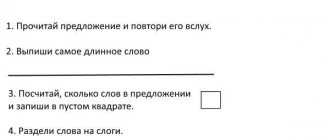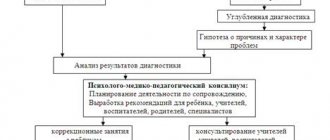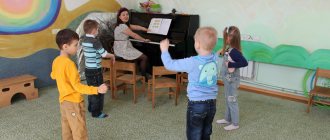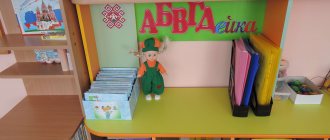Under the guidance of a speech therapist - the principle of successful speech development
Only a speech therapist can solve a problem with pronunciation in a comprehensive manner.
Caring parents, trying to save their child from possible complications at school, begin to work with him on speech development. A properly designed exercise program and competent work methodology will bring tangible results in two directions :
- Active expansion of the lexicon , the child becomes aware of the peculiarities of the composition of words of different parts of speech;
- Improving oral speech , which, in turn, mobilizes the areas of the brain responsible for thinking, memory, alertness, concentration and reaction.
However, maximum results can only be achieved in suitable living and learning conditions. And for this it is necessary to provide the child, especially if he suffers from speech impairment, with classes with a speech therapist.
A school speech therapist deals with problems in the field of speech defects, correction and prevention of speech disorders, and has knowledge from various fields of pedagogy, humanities, exact and natural sciences related to speech and medicine, psychology, neurolinguistics and other related disciplines. Classes and consultations with a speech therapist will help to competently and timely diagnose the disorder, create a set of necessary exercises aimed at correcting and further eliminating problems in pronunciation .
At the same time, the work of a speech therapist in school is not limited to solving specific problems of correcting specific violations in individual students. Its main goal is to systematically identify children with speech impediments from the stream of students.
What qualities should a speech therapist have?
Essentially, a speech therapist is a kind of teacher who must show great patience and understanding towards his students. The most important character traits are love for children, patience, emotional restraint, calmness, curiosity, perseverance, perseverance and endurance, because the results of the work done often make you wait a very long time. With some people, it takes more than 2-3 years to achieve visible improvements.
If it is easier to work with children, because they learn quickly, then with adults the situation is different. Few are able to admit their shortcomings and go to a specialist. For this reason, a professional speech therapist must be able to find an individual approach to everyone, be able to tactfully figure out the problem and, without hurting the patient’s feelings, provide primary consulting assistance. Therefore, it would not hurt for a specialist to know at least the basics of human psychology.
The speech therapist must be responsible, because he has no right to make a mistake in making a diagnosis. If he incorrectly identifies the problem and prescribes an ineffective treatment method, this can turn into a real tragedy for patients: speech defects tend to lose the ability to be corrected over time, so it is very important to eliminate the deficiencies in a timely manner. Over time, they will be much more difficult to get rid of, which is why the speech therapist has such a great responsibility.
Communication, training, adaptation - vectors of speech therapy education
Classes with a speech therapist teach children to adapt to various life situations.
Speech therapy classes help children not only in their speech practice, but also simultaneously develop their learning skills and cognitive functions, prepare them for intensive work with teachers , and teach them to separate play and learning activities.
Formation of arbitrariness
During the border period between preschool life and within the walls of an educational institution, is especially important, along with the development of speech, to form in the child a correct perception of the new reality . More than half (78%) of six-year-old children are not mentally prepared for school; in the case of seven-year-old children, the percentage is half as much, but also remains significant (20-30%). And here a specialist should also come to the rescue.
The researchers came to the conclusion that a child who is psychologically ready for school must have a sufficient level of voluntary and volitional development.
Undeveloped voluntariness can be inherent even in gifted children who are distinguished by cognitive activity.
Despite this, they may make mistakes that are not related to either grammar or dysgraphia, which is typical for children with speech disorders. This is often expressed in the design of the letter - sloppiness, dirt in notebooks, insufficient pressure on the pen, low writing speed.
Such children make the following specific mistakes :
When writing
- do not distinguish between “k” and “p”
- incorrectly copied from the board;
- incorrectly reproduce sentences, phrases, words and sounds
- get tired and make more inaccuracies by the end of the lesson
- has difficulty working with the alphabet
- has difficulty mastering basic spelling patterns
When reading
- skips or repeats pronunciation of lines
- reads with errors
- reads slowly
- doesn't remember what he reads well
Voluntary skills require the child to be aware of his own behavior ; he must be able to treat himself as if from the outside, looking at himself a little detached, and analyze the order of his actions. In the conditions of modern education, it is quite difficult to form voluntary attention in children, since all tasks come from an adult, and the child only has unquestioning obedience.
Stages of preparation for voluntary activity
In order for a child to be prepared for voluntary activities, he needs to go through several communication stages from a very young age.
- At the first stage, the word acts as the final phase of any action; it seems to consolidate the result.
- At the next level , at an older age, the child already sets the task in verbal form, and only then does action follow.
- By the age of 5-6 years, a child can already regulate his behavior and control his actions, accompanying them with speech.
It is competent speech, clearly formulated tasks and plans that allow you to achieve your goals. As a result, a first-grader who has mastered the skills of voluntary activity can already distinguish the main from the secondary and analyze the speech space.
The development of voluntary attention will help to form and develop creativity in a child, the ability to communicate successfully, solve problems of varying complexity, and quickly and painlessly adapt to new conditions. All this can be achieved in classes with a speech therapist teacher, in small groups, where both an individual approach and team activities are important.
For more information about the competencies of a speech therapist, watch the video .
Speech therapy work in kindergarten, its methods, goals and objectives
Speech therapy work with preschoolers is based on speech therapy - special work. pedagogical science on preventing and overcoming speech imperfections. This work distinguishes between two systems. One of them is used in special kindergartens for children with severe speech disorders - in normal kindergartens.
The subject of the latter is primarily the age-related characteristics of children's speech, and to a much lesser extent, shortcomings of pathological origin, which do not interfere with the upbringing of a child in a normal kindergarten.
Speech therapy uses both generally accepted methods of speech development and its own specific methods for correcting speech deficiencies. The specificity of these special techniques appears most clearly in pathological cases.
The purpose of this work is to help the normal formation of a preschooler’s speech, and consequently, the full development of his thinking.
The goal is to help prevent speech disorders, help the child’s natural desire to overcome age-related and sometimes pathological speech deficiencies, develop and improve methods of speech therapy work in accordance with the capabilities, needs and interests of the preschooler.
1. The name “speech therapy” consists of two Greek words “logos” - word, speech and “paideo” - teach, educate.
2. “Imperfection” of speech and synonyms of this term (“shortcomings”, “distortions”, “flaws”, “shortcomings”) we call any deviation in the development of children's speech from the normal speech of adults - age-related or pathological. For age-related characteristics of children’s speech, the term “originality” of speech is also used. In pathological cases, the following terms are used: “violation”, “disorder”, “anomaly”, “defect”, “pathological defect”.
To master speech therapy, you need to know your native language well, especially phonetics, and have certain information from the physiology and psychology of speech and from medicine. Language occupies an extremely important place in the development of a child. Only through his native language does a child enter the lives of the people around him. A child needs a good knowledge of the Russian language to study other subjects, to master the kindergarten curriculum, and subsequently school.
I. P. Pavlov gave a natural scientific basis to the doctrine of language. Language, according to him, not only replaces the direct action on the brain of all internal and external stimuli, but also abstracts and generalizes them, and is thus an instrument of the highest level of thinking.
Speech is an extremely subtle, complex and accurate form of reflection of objective reality in the human brain and is, in the words of I. P. Pavlov, “the highest regulator of human behavior.”
Consequently, the native language is a means of communication, expression and formation of thoughts and, thus, serves as “an active, powerful means of comprehensive development of the child’s personality” (A. I. Sorokina).
All this places great demands on the quality of our speech. That is why the main task of a kindergarten (the comprehensive development of preschool children) necessarily includes the development of full speech in a child. An indispensable condition for the normal development of speech is the timely prevention and elimination of all kinds of shortcomings (burr, lisp, stutter, etc.).
The more clear and expressive a child’s speech is, the easier it is for him to express his thoughts, the deeper and richer his ability to understand reality. The more perfect a child’s speech, the more correctly his relationships with children and adults will be formed, that is, his behavior, and therefore his personality as a whole.
Age-related speech imperfections in early childhood (from 1.5 to 2.5 years) generally correspond to the mental and physical development and intimate relationships of the child with the mother and with other family members, with his needs and their satisfaction. But in the future, due to imperfect speech, certain inconveniences and difficulties in contact with others gradually arise and increase.
Already from the age of 4-5, more developed children themselves begin to notice the shortcomings of their speech and often experience them painfully. They are embarrassed to speak, avoid words with sounds that they pronounce incorrectly, become irritable and are reluctant to go to kindergarten, and subsequently to school. They develop a feeling of inferiority, a fear of “corrections” and ridicule from children.
Guided by dialectical-materialist philosophy and the teachings of I.P. Pavlov on the development of conditioned reflexes through education and training, Soviet psychology and pedagogy proved that language develops as a result of learning - a child learns from the examples of adults, imitating their language, following their instructions.
From the above, it becomes obvious that teaching preschoolers, to the best of their ability, pure pronunciation, correct speech structure and eliminating the speech pathology that sometimes occurs in them should be one of the important tasks of the kindergarten.
Timely prevention and elimination of child speech deficiencies is an urgent task for all our kindergartens.
The most favorable age for speech therapy work
It is best to teach correct speech and overcome its shortcomings in preschool age. The following characteristics of a preschooler contribute to this.
1. High plasticity of the brain, i.e. the ability to quickly and easily switch to new circuits and also overcome the consequences of their violations. This explains the increased imitation of adult speech in children and the easy alteration of speech sounds. The flexibility of the child’s brain lays the foundations for overcoming the child’s speech imperfections through pedagogical influence (exercises, repetitions; however, it is necessary to take into account the rapid fatigue of young children).
2. The ability to turn everything into a game. Children willingly play various games using speech and thereby achieve faster success in it.
3. Children's love for speech sounds and the desire to master them. Children play with sounds and mechanically repeat them many times. They are early aware of phonetic norms and try to master them (A. N. Gvozdev).
Children love to work on improving their speech, especially on the purity of pronunciation; they show great interest and persistence, watch each other, suggest to each other sounds or the required positions of the tongue and lips. They willingly play with sounds, notice the differences between them, memorize words, nursery rhymes, and poems. Having mastered the correct pronunciation of a particular sound, children rejoice, are proud of their victory, demonstrate the new sound to others and wait for approval. They stop being shy and become more sociable.
4. Fragility of erroneous speech skills. Temporary connections in the cerebral cortex have not been strengthened and are therefore easily inhibited.
So, in children of three and four years of age, the relative development of the brain in general, hearing and speech-motor apparatus, in particular, allows them to master correct pronunciation by the end of their stay in kindergarten. The flexibility of the kindergarten regime makes it possible to devote enough time to this.
The role of the teacher, doctor and parents
A kindergarten teacher first of all has to deal with the natural age-related features of speech for a child, in other words, the phonetic (pronunciation of individual sounds and their combinations) and musical (rhythm, tempo, intonation, modulation, strength, clarity of voice) originality of children's speech.
Overcoming such shortcomings does not present any particular difficulties, since the teacher, using the correct teaching methods, only helps the natural process of the normal development of children's speech, accelerating it. This makes it easier for the child to master such complex activities as speech and promotes earlier mental development. Only in very rare cases does a teacher have to deal with pathological speech defects (for example, burr due to a short frenulum of the tongue, poor speech due to hearing loss, stuttering, nasality). In such cases, they resort to the help of a doctor. He treats, operates, and prosthetizes the speech organs, thereby creating favorable conditions for the development of correct speech.
But this is not enough to get it. The child must be taught the correct speech skills, that is, the correct conditioned connections must be developed in his brain. The leading role here belongs to the teacher. In severe cases that are difficult to correct, for example, nasal sounds due to cleft palate, children are sent to special kindergartens.
A teacher in a normal kindergarten still sometimes has to help such children form correct speech, involving a speech therapist.








